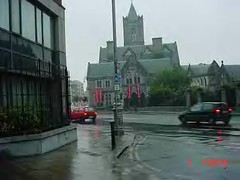DUBLIN, Ireland
 DUBLIN, Ireland:
DUBLIN, Ireland:Britain has fulfilled its promise to reduce its troops and military bases in Northern Ireland to peacetime levels, an expert report on the cutback program concluded Monday.
The report from the Independent Monitoring Commission said Britain had more than honored its two-year cutback plan, which was launched in August 2005 in response to peacemaking moves from the outlawed Irish Republican Army.
The commission — a four-man panel tasked with assessing the activities of British security forces and outlawed paramilitary groups in Northern Ireland — was appointed jointly by the governments of Britain and Ireland. Its members include a former director of the U.S. Central Intelligence Agency and an ex-commander of Scotland Yard's anti-terror branch.
Britain in August 2005 published a detailed plan promising to cut its military strength in Northern Ireland to a maximum of 5,000 troops operating from no more than 14 bases by the end of July 2007.
But the troop reductions have run "consistently ahead of schedule," the report said. The number of troops at the end of July had fallen to 4,275 and all but 13 bases were shut down or demolished.
The panel said British authorities needed to concentrate on two remaining areas: reducing the use of non-jury trials in Northern Ireland in cases involving crimes committed by paramilitary members, and the failure to remodel police stations to make them look less like frontier forts.
"In our view the pace of defortification needs to be increased," the report said, referring to the elimination of car bomb barriers, anti-rocket netting, bulletproof sentry posts and other security measures designed to protect police from IRA attacks.
Britain's cuts have been dependent on good behavior from the IRA, which killed nearly 1,800 people from 1970 to 1997 but renounced violence in July 2005 and disarmed the following September.
The experts repeated their view that the IRA, though still in existence, posed no threat to troops or police because its leaders were instructing members to get involved in politics and community work. They said IRA dissidents continued to pose a sporadic threat to police and politicians but do not "have the capacity to mount a sustained campaign."
From July 2005 to July 2007, the report found, the number of troops fell from 10,028 to 4,275; army bases from 24 to 13; and border watchtowers from 10 to zero.
Those troops that remain in Northern Ireland are training exclusively for deployment overseas, such as Iraq or Afghanistan, the same status as anywhere else in the United Kingdom. Britain's Justice and Security Act 2007 permits soldiers to be used to support the police — the army's original mission in Northern Ireland in 1969 — only if ordered into action by Northern Ireland Secretary Shaun Woodward, the senior British government official in the province.
On the Net:
Independent Monitoring Commission report,



0 Comments:
Post a Comment
<< Home